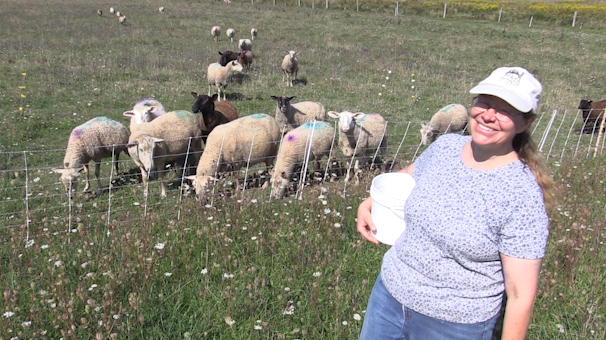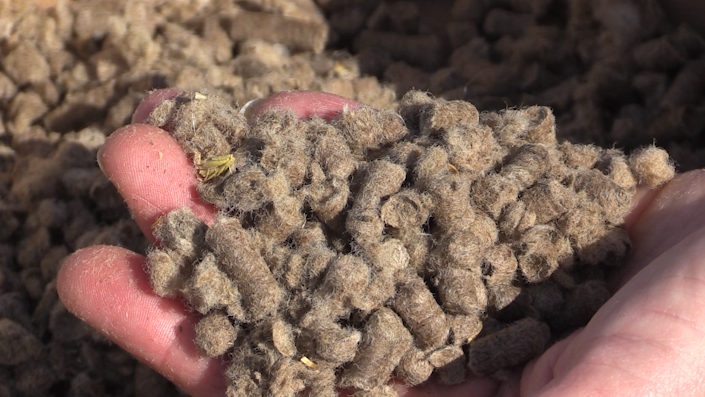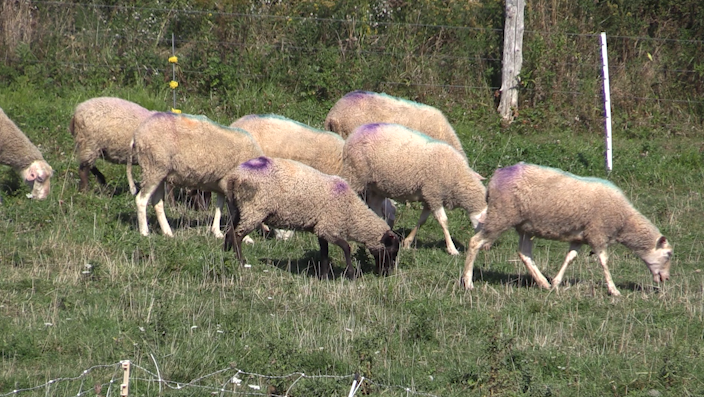Sheep farmer piloting using excess wool as field fertilizer
Jennifer Osborn, a local farmer, believes Canada, and really, the world, has a wool problem.
"Particularly in Ontario, most of our wool actually is burned, dumped or landfilled, which is really a shame. Farmers don't get a very good price for it. The international market doesn't pay anything for it. And wool is less than one per cent of the textile industry globally," said the Mount Forest area farmer.
As a regenerative sheep farmer at All Sorts Acres, Osborn started turning that excess wool from her own farm into wool pellets and spreading them on her garden and pasture. Wool naturally holds water extremely well and has other attributes that are good for the growing.
"It has more nitrogen content than any manure out there, including cow, goat, sheep, chicken and also mushroom compost. So, it's a really interesting material. We are kind of looking at it as a resource, instead of just to be used for clothing like hats, scarves, mitts and things like that. It's actually a really valuable resource," said Osborn.
 Jennifer Osborn with her sheep near Mount Forest, Ont. on Sept. 16, 2024. (Scott Miller/CTV News London)
Jennifer Osborn with her sheep near Mount Forest, Ont. on Sept. 16, 2024. (Scott Miller/CTV News London)
Anecdotally, wool and wool pellets have helped portions of Osborn's pasture over the past couple of years.
So, this spring, she partnered with Grey County Ag Services' Experimental Acres program for monthly soil testing to see how different levels of application of wool pellets impact the soil on small test plots.
"We need to learn to find out how we can use this incredible resource, this natural circular resource, as maybe not a whole replacement, but at least a supplement to some of the chemical fertilizers that are needed. But can we reduce that? Can we make it easier for farmers, while actually using a resource that farmers are paying to get rid of a lot of the time?" she said.
Osborn's EcoWool Pellets on Pasture pilot project is one of seven Experimental Acres projects that focus on sustainable and innovative agricultural ideas, taking place in Grey County this year.
 EcoWool wool pellets. (Scott Miller/CTV News London)
EcoWool wool pellets. (Scott Miller/CTV News London)
Wool pellets as fertilizer or fertilizer supplement fit those parameters and Canada's goal to reduce greenhouse gas emissions from synthetic fertilizer application by 30 per cent by 2030.
"Imagine if wool pellets could actually take the place of that because these are natural products. They last. They're good for the soil, but they're also good for the environment. So, they're not going to harm, they're not a poison," said Osborn.
 Sheep at All Sorts Acres near Mount Forest, Ont. on Sept. 16, 2024. (Scott Miller/CTV News London)
Sheep at All Sorts Acres near Mount Forest, Ont. on Sept. 16, 2024. (Scott Miller/CTV News London)
You can learn more about Osborn's EcoWool Pellets and Grey County's Experimental Acres by visiting EcoWool Canada and Experimental Acres.
CTVNews.ca Top Stories

Prime Minister Trudeau meets Donald Trump at Mar-a-Lago
Prime Minister Justin Trudeau landed in West Palm Beach, Fla., on Friday evening to meet with U.S.-president elect Donald Trump at Mar-a-Lago, sources confirm to CTV News.
'Mayday! Mayday! Mayday!': Details emerge in Boeing 737 incident at Montreal airport
New details suggest that there were communication issues between the pilots of a charter flight and the control tower at Montreal's Mirabel airport when a Boeing 737 made an emergency landing on Wednesday.
Hit man offered $100,000 to kill Montreal crime reporter covering his trial
Political leaders and press freedom groups on Friday were left shell-shocked after Montreal news outlet La Presse revealed that a hit man had offered $100,000 to have one of its crime reporters assassinated.
Questrade lays off undisclosed number of employees
Questrade Financial Group Inc. says it has laid off an undisclosed number of employees to better fit its business strategy.
Cucumbers sold in Ontario, other provinces recalled over possible salmonella contamination
A U.S. company is recalling cucumbers sold in Ontario and other Canadian provinces due to possible salmonella contamination.
Billboard apologizes to Taylor Swift for video snafu
Billboard put together a video of some of Swift's achievements and used a clip from Kanye West's music video for the song 'Famous.'
Musk joins Trump and family for Thanksgiving at Mar-a-Lago
Elon Musk had a seat at the family table for Thanksgiving dinner at Mar-a-Lago, joining President-elect Donald Trump, Melania Trump and their 18-year-old son.
John Herdman resigns as head coach of Toronto FC
John Herdman, embroiled in the drone-spying scandal that has dogged Canada Soccer, has resigned as coach of Toronto FC.
Weekend weather: Parts of Canada could see up to 50 centimetres of snow, wind chills of -40
Winter is less than a month away, but parts of Canada are already projected to see winter-like weather.


































